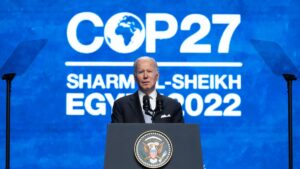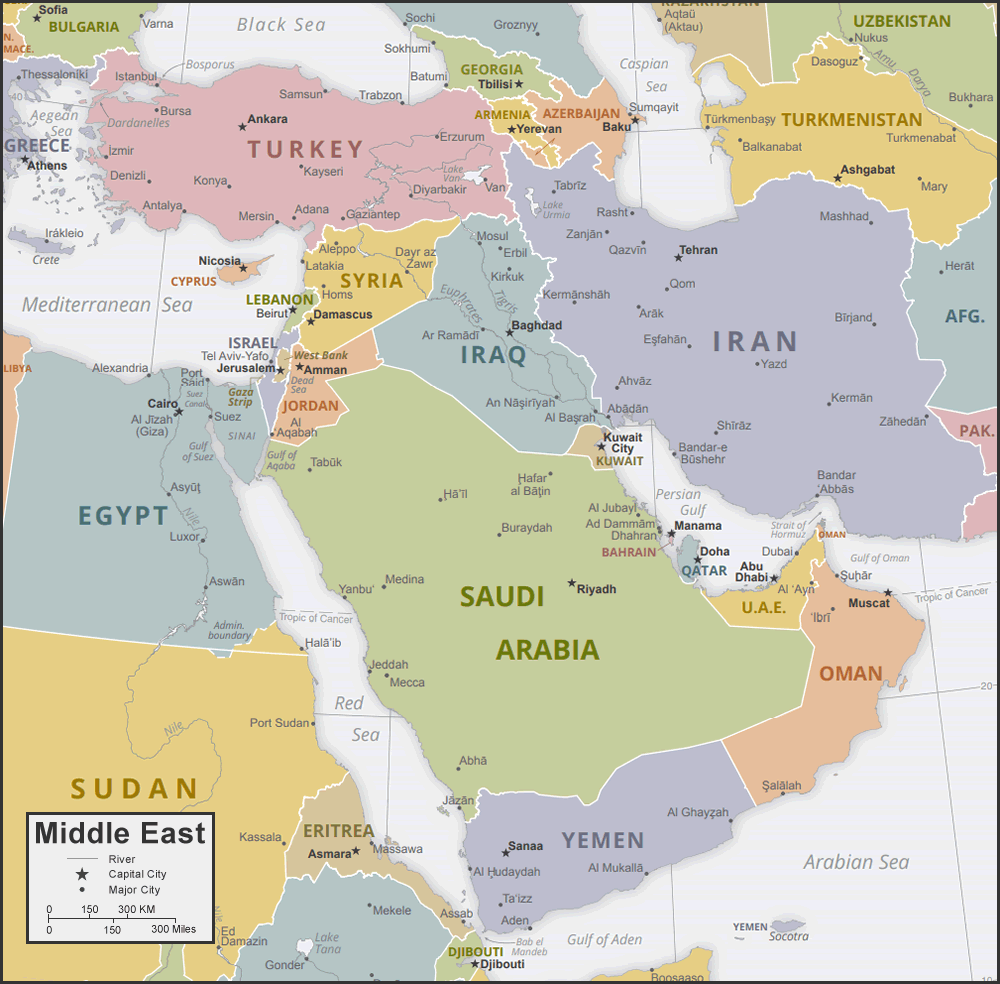Mass Media – A Necessity?
December 18, 2022
Mass media are necessary for the public to interact with itself, and the government. In the MENA, there has been a significant concentration on the government speaking to/influencing the masses, which is very foreign to more democratic countries, such as ourselves. However, it is important to realize that we are not as dissimilar as we think. Our government still disperses mass media to citizens, and may simply be less direct. Additionally, we consume a larger variety of mass media – more diverse news sources, through countless different means. From cnn to fox news, from the radio to newspapers, we digest mass media every day.
My personal belief is that mass media do more bad than good. They disable original thought, and the ability to share it in the same extent as the media source, giving a news station far more power than the people. Mass media has also become extremely polarized, heavily dividing the entire population into black and while circles with no grey. They have also heavily impacted the health of entire nations. Sensationalism has increased an obsession with comparison: more people are suffering from eating disorders, anxiety, depression. The world has also fallen into mass consumerism, promoted by television stations constantly advertising products to “improve your life”, or become similar to an idolized teenager.
At this point, mass media is no longer about spreading fair, true information. It has become a means of controlling populations, and has resulted in extremism and rapidly declining physical and mental health. I hope that one day, mass media will return to a safer, more honest form of independent media, somewhere in between social media and mass media.
Regulating Religious Expression – When is it Too Much?
November 29, 2022
The First Amendment of the United States Constitution allows freedom of speech and expression. However, this is not the case globally, particularly in MENA countries. This could be through enforcing a state religion, or banning specific religions within the state, and supporting others.
Religious regulation can occur for numerous reasons. By enforcing religious laws, a universalized state religion can create a sense of deepened community and nationality. However, this feels like a cop out of any real motivations for religious regulation. Regulating religion may actually be a tool in order to protect political powers from being overcome by the religion itself, as “Politicians often fear religion’s potential political power and seek to keep it in check“.
Regulating religion can also be used as an attempt to control public cultures, which are often difficult to regulate. Looking through official documents of religious MENA states appears to be extreme, but is actually from a voice of fear. Many countries with religious regulation are desperate for total control of the state, and the severity of religious laws illustrate just this. By heavily regulating religion, the state is grabbing for control in every possible aspect of human life, and have zero tolerance for anybody to live outside of state regulation, as it challenges everything the state has worked for. For example, in Saudi Arabia, there is a clearly drawn state religion, which is woven through the legal systems, forcing people to abide by the religion in everyday life, and justifying extreme persecution for not following the state religion, and has been visibly enforced,
While there may be reasons for religious regulation, there is no definitive amount of religious regulation that all should abide by. Even in the United States, where there is freedom of religion written into the constitution, it is written into a constitution that is tightly woven with christianity. Ultimately, religion will be present in nearly every single state, and unfortunately, religious decisions are not always made by the people – they are made by the government.
Voices in the 2022 United Nations Climate Change Conference
November 14, 2022
The United Nations Climate Change Conference is currently underway, ending on the 18th of November. Its purpose is to set an agreement on preventing global temperature increases, by discussing preventative actions.
More than 200 governments are invited to attend, however, some global representatives will not be in attendance. Most notably – several Egyptian government critics have been excluded from this event. Not only was the selection criteria made public, but many civil groups were told they were not invited in advance, and there was no available as to how to apply for attendance.
By preventing its own anti-government voices from attending, Egypt is deliberately removing some of its own voices in order to mask its own public issues with poverty and pollution, and is publicizing its false wellness through COP27.
Besides Egyptian government critics, there are several notable figures that will not be present for COP27. This includes: several Chinese leaders, climate leader Greta Thunburg, Putin, Prime Minister Albanese, and President Bolsonaro (Brazil). They are not attending for a variety of reasons, ranging from war to simple distain for the event.
Meanwhile, many other world leaders will be in attendance: President Biden, and representatives from across Europe and Africa. There will also be numerous non-government organizations present, making COP27 the second largest by population in attendance.
The politics of the countries within the GCC (Gulf Cooperation Council) have been tightly held down through authoritarian rule. Saudi Arabia, for example, has been under the rule of the House of Saud, the ruling royal family. This royal family been an influence the state for several hundred years. If Saudi Arabia were to fall into a period of radical uncertainty, where the government had fallen, there would be many issues with media, particularly print media, making it difficult to find reliable media sources.
The Saudi Arabia Government currently has a heavy hand on print media, particularly newspapers. While many of these mass media sources are privately owned, they are paid and influenced by the government. If the Saudi Arabia government were to fall, these private media sources would open into a wide range of government criticisms, and publish articles of great controversy against the state. However, as they would no longer be heavily subsidized by the government, there would be an increase in pressure to sell more newspapers, which would likely turn articles towards sensationalism.
In order to find less sensationalized media (seen in the theoretical mass media), and looking toward informational media, the answer appears to lie in what would be the theoretical social media of Saudi Arabia-post-government-fall. While this media may be more biased, it would be more focused on real events than sensationalized media. Additionally, as governments fall, there tends to be a larger quantity of political parties which attempt to gain power quickly. Several large mass media outlets would not be able to fairly report on all of the different political “options”, while social media can.
Presently, Saudi Arabia “permits no independent media” according to Reporters Without Boarders. However, it is important to mention Al Jazeera’s presence within Saudi Arabia. Al Jazeera is presently reporting Saudi Arabia news, and would likely continue in the event of a Saudi Arabia government collapse. Al Jazeera’s presence would explode during a time of unrest, as it allows for multiple different voices, perspectives, and opinions.
Halfway: “A Course Reflection” (My Personal Opinions)
October 7, 2022
Throughout Media and Politics in the Middle East and North Africa, I have renewed my understanding of media – its prevalence throughout history, and the extent of its effects.
While I have learned more about media (particularly mass media), I have not changed my media habits or relationship to mass media. Prior to this class, I had a distaste for media. It was and still is my opinion that current media is somewhat of a sickness. While media framing serves both the producer (making money and pushing an agenda) and the consumer (entertainment, a detached feeling of involvement, and sometimes political reassurance), it comes at a cost to all. Opening a website or newspaper, the front page tends to be concentrated with negativity or superficial controversy. If not, it is mindless filler articles about past events that have no serious effects. I have never enjoyed media, aside from entertainment pieces. The only difference between my previous media consumption and my media consumption now is that I have added another grain or two of salt to an entire bottle of media distaste is the form of sodium chloride.
I would also like to mention that personally I am shocked that not as many people were aware (if at all) of media bias and how much actually happens “behind the screen”. There is also an element of self awareness and self importance. Looking at MENA, American reporting is usually through a heroic, patriotic lens, and on top of that, usually the political lens of the reporting organization. Additionally, there is a presence of somewhat “selective hearing”. People seek news that agrees with them, and current media can pick this pattern up, only presenting more media that continues a specific set of values and opinions. People like to think that they are important, and more importantly, that they are right. This creates a sense of superiority and heroic, “Player one” archetype. The truth is, this “superhero” is really just some 30-50 middle aged, genderless, colorless body sitting on a grey couch and watching CNN or FOX, arguing in the depths of the comment section on a reddit post that 10 people will click on and 2 will read. Reddit is a form of social media, but the second a polarizing piece of news appears, it is snatched up by the claws of the painfully present mass media of a two party government, locking up in a never ending tug-of-war. The truth is, news just locks up an already stuck system. At the end of the day, the government will create the same response that was always going to happen, and send the same, filtered news out to a population that is unwilling to compromise. Watching the news and arguing to deaf ears does not create change. It makes people angry, and it makes news cooperations money.
I suppose it is somewhat of a hypocrisy that I expect people to be aware but not participate, and I am aware that I have many moral flaws in my opinion. However, my opinion is just that- an opinion. And, morality is a matter of opinion in the form of social rules.
I feel as though as I have no power (except for voting) to make a serious impact on anything. Yes, you can create and participate in protests, but they just slowly get silenced and “addressed” until people calm down and return to their processed sugar and antidepressants and watching screens full of garbage. I have my own opinions, and rather than making myself and others angry, and making some cooperation (that I do not care for) money, without actually making change, I’ll choose to vote and mind my own business. If I wanted to get my hands dirty, I’d serve our country. Instead I’m just paying taxes.
Divorce Over Text Message – A Look at Marital Gender Roles
September 24, 2022
Over the past few years, a new trend has emerged in Saudi Arabia – men divorcing their wives over text message.
The legality of divorce in such a detached manner makes marriage feel more like a contract than a declaration of love and partnership. Just like one would check their email for news alerts, married women in Saudi Arabia may simply check their phone and find an alert for a change in marital status.
To some, marriage is now seen only as paperwork – without connection to their significant others, viewing wives as things that can simply be taken and pushed away by signing on the dotted line. This puts husbands in legally enforced marital power over their wives, and sets a precedent of dependence upon the family patriarch.
It is painfully clear that women (in this case, particularly in Saudi Arabia) have no control over marriage. Husbands can simply divorce wives without their consent or mutual agreement. Sudden divorces leaves many women without income or homes, and entirely stranded in a society in which they have limited rights.
From this, it can be deduced that the power imbalances between men and women is not just situational – it is legally engrained in everyday life. Children may live in situations in which their mothers can be removed from their family at any time, and wives may be under constant stress to keep their husbands from leaving whenever they would like, not to mention the worries of supporting oneself when the right for women to drive was only approved a few years ago.
This highlights the fact that while women press for more independence and rights, they are still heavily reliant upon those that they are fighting against. Many women would like to be more empowered, but can only do so with resources from men.
Media challengers are beginning to influence the roles of women in the public sphere throughout the Gulf Cooperation Council (GCC). Female representation within the public sphere has been extremely disproportional, which may be related to gender roles throughout the GCC.
However, given the increasing presence of social media, gender roles have been questioned, and in some cases, are changing due to activism. The use of social media allows many people, particularly women, to speak their minds regarding their gender roles. This growing media presence has mobilized women to challenge the government, and unite to create change.
States within the GCC have “aim[ed] to establish the public sphere’s foundations, delineate its boundaries, and monitor its content both regarding its inward-facing and outward-facing news coverage” (see link below). This state control of the public sphere dangerously impedes upon the voices of women. Simple feminist GCC searches have yielded few results, virtually no photographs, and primarily dense scholarly articles that were written outside of GCC states.
The unity between women has been possible due to the increase of social media. In recent events, GCC society has seen an increase in women resisting and condemning patriarchy and misogyny. In addition to this newfound resistance produced by social media, women have also grown to resist gender norms, and promoting their ability to speak out, fighting gender violence and sexual harassment. This speaks directly against the patriarchal norms of GCC society, in which women are expected to be quiet and submissive to men.
Ultimately, the simultaneous presence of widespread social media and female education/entrance to the workforce has created a media uprising of Arab women embracing activism.
Personally, I would like to look at the statistics between feminist uprisings within the GCC (and perhaps note a presence of censorship), and compare that to changes/increases in female education and female presence within the workforce.
I would also like to look at male roles within the household at the same time – looking at men becoming “stay at home dads”, which is somewhat radical even in the western world.
Looking at the radical switch from women being “quiet” and “submissive” within a patriarchal society to uprising against government and calling out their abusers, pushing for change, Social media must have some presence in its ability to organize women. I would also like to investigate government control of the media – how do women work around censorship? is there censorship? why would the government want to suppress women?
Today I was privileged to participate in the Clarke Forum. I have never had a reason to go over my past 2 semesters at Dickinson, so it was nice to do something new.
While I entered ATS and sat down, I was solely focused on relating this presentation to Media and Politics in MENA (Middle East and North Africa). However, what was discussed was somewhat of a mashup between my FYSM class, and the current MENA class.
To give some context – my FYSM class was centered around “Black Horror” – the portrayal of black populations in America across all different types of medium. Originally, it was really just a requirement I had selected because we got to watch a movie during class. However, as most of my graduation requirements end up going, of course I ended up loving it. There is something about taking a class that you don’t “need” to try and perfect, that results in learning the most. By not “having” to stress about a class as some kind of step into a new chapter of organic chemistry or genetics makes it all the more captivating, and more of a personal interest.
Throughout the forum, my past connections and knowledge on media’s portrayals and their historical/political significance really was able to shine through, allowing me to better understand the presentation.
Our presenter for today focused on the commonly known “black twitter”, specifically with regard to “karen” memes. The context of black twitter was touched upon as a social sphere – allowing a collective community (in which virtually anybody could join behind a screen) to voice racial aggressions to a huge audience. These collectively experienced microagressions were made possible through media – video recordings of the police calls made by “karens” and photo/video evidence of situations were posted for the world to see, comment on, and share to other to repeat.
This gave way to a particular type of media: memes.
Memes are extremely prevalent on social media apps today, due to their simplicity, humor, and entertainment. They are rapidly shared, and by using the same format, easy for large audiences to understand. Given their humorous nature, many people on Black twitter who have suffered racial injustice and trauma used this type of humor to cope and spread awareness – seeking change so these actions do not go unchecked.
One particular situation was the focus of tonight’s forum – an incident in which a Black family was having a barbecue in a public park, when a white woman confronted the family and called 911, citing that the family was not allowed to use coal in the public grill, and later called 911 again.
This situation reached Black twitter, and spread like wildfire due to the ability of social media to bounce from one person to another in seconds. Memes can be created in a matter of minutes, and they started to snowball. First from rapid sarcasm, and then eventually reaching for more politically academic topics regarding BLM history and national reception of Black Americans (seen in the two memes below). This illuminated the stereotype of white women harassing Black people under the veil of being upstanding, moral citizens.
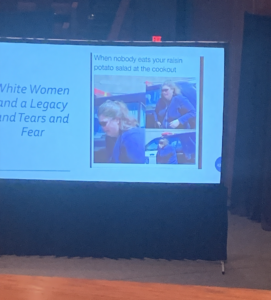
A milder meme that included the stereotype of white women putting raisins in potato salad (which not many people like). Made me laugh.
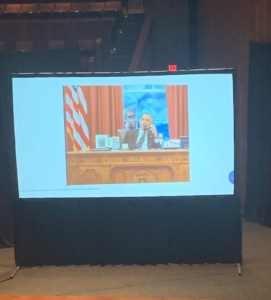
Note the same Karen from this picnic example being shown peering through the window – beginning to touch on relevant political topics that are controversial. This made me laugh harder. I included a similar version below that is less grainy but is the same general concept.


This was one of the last karen memes that we saw regarding this woman who interrupted a family picnic.
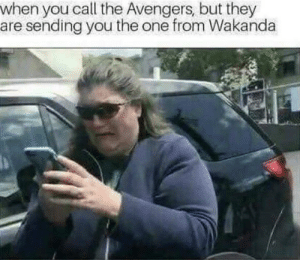
one that I looked up myself and found funny
Social media allowed massive communities to spread this information, and with each share, a new idea/comment/concern/personal anecdote could be added, and created what was essentially political art through amusing photos.
It is this social media prevalence that picked up the attention of mass media, which began spreading these stories to a larger audience – people from much different backgrounds, who may have different political views and personal beliefs. This actually created some serious political movements – particularly the C.A.R.E.N Act, in which racially motivated 911 calls are illegal.
A final thing that I found fascinating in the scope of our media class – during the beginning of this presentation, it was touched that media is also looking back at you. Many times, we find ourselves sitting behind the comfort of a screen, or even hiding behind it. The word “panopticon” (a new word for me) was briefly defined. Essentially, in prisons, prisoners do not know when they are being watched and they are not – this creates a culture in which prisoners self govern, and constantly act if they are being watched whether or not they actually are. This creates a feeling of constant stress, as one would naturally feel if they always had somebody “breathing down their neck” and watching their every move.
While this was used as a comparison to give context to the lived experience of Black individuals today, the theory of the “watched” versus the “watcher” is incredibly important when we study media. As we consume media, it is important to remember who we are, who we are watching, who is watching for us, and who is watching us. (or those we are studying).
I will not lie – I had originally only went to this forum with the goal of some extra credit in mind. However, I came out actually enjoying it? It was nothing like the 75 minute lecture I was bracing for. It left me intrigued and hyperfocused on wiki pages regarding “karen phone calls”. I intend on participating in the next clarke forum as well.
What is the GCC? – A Brief Introduction to the Gulf Cooperation Council.
September 9, 2022
A Geographic Perspective:
Border Geography
The Gulf Cooperation Council (GCC) is a collection of States located in the Middle East. It shares land borders with Jordan, Iraq, and Yemen, along with coastal borders to Egypt, Somalia, Sudan, and Eritrea.
The Countries included are:
- Saudi Arabia
- United Arab Emirates (UAE)
- Qatar
- Kuwait
- Oman
- Bahrain
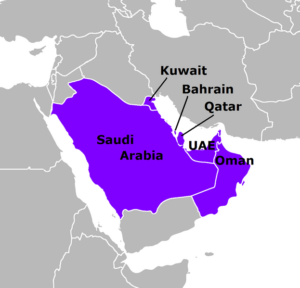
A map of the GCC countries. https://www.hadielfarr.com/gulf-cooperation-council.html
Physical Geology (Topography)
Land within the GCC is diverse – it includes the Arabian Desert, grasslands, mountain ranges, highlands, and volcanic fields. While there are not many permanent bodies of water, flash floods and non permanent rivers are common.

Geography of the Arabian Peninsula http://saudi-archaeology.com/background/geography-arabian-peninsula/
The GCC has a fairly large extent of coastal land compared to its size. It is connected to the Red Sea, Arabian Sea, and Persian Gulf. While it is not connected to the Mediterranean Sea, it is extremely close to it.
Culture Within the GCC:
Infrastructure
Several projects were created in order to improve power and water supplies, along with improvements to transportation systems, specifically railroads.
Government
There are several different levels of government within the GCC, each with its own purpose:
- Supreme Council
- The GCC has a reigning “Supreme Council” which has a representative from each state – typically the head of each state.
- Ministerial Council
- Secretariat General
- Monetary Council
- Patent Office
- Peninsula Shield Force
- GCC Standardization Organization
- Gulf Organization for Industrial Consulting
Language
Arabic is the official language of GCC countries, and dominates the population. Other commonly used languages in the GCC are English and Hindi.
Historical Events and Foundation of GCC:
Creation of the GCC occurred in 1981, following a meeting of several powerful politicians. Several different goals were made to improve all member states of the GCC.
- Common market and currency
- Customs union
- Unification of military, state populations, and regulations
- Creation of new and improved education, science, and technology
Due to the prevalence of oil and natural gas, many of these goals were able to be funded, and the economy has significantly surged.

